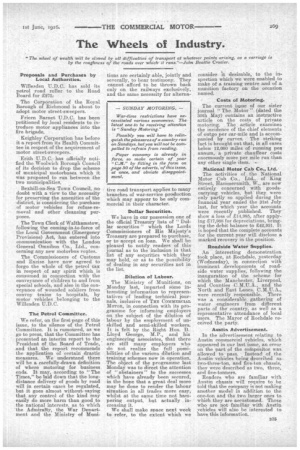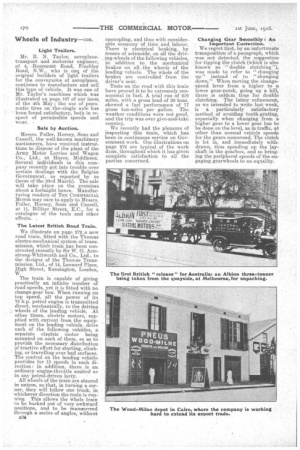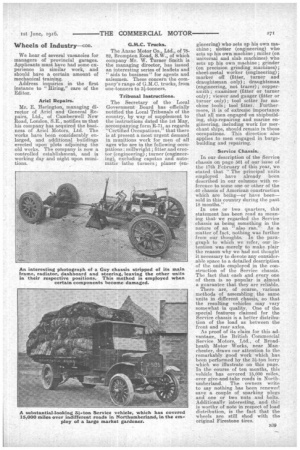The Wheels of Industry.
Page 7

Page 8

Page 9

If you've noticed an error in this article please click here to report it so we can fix it.
The wheel of wealth will be slowed by all difficulties of transport at rvhatevei points arising, as g carriage is by the roughness of the roads over -which it runs.----John Beattie Crozier.
Proposals and Purchases by Local Authorities.
Willesden U.D.C. has sold its petrol toad roller to the Road Board for £275: The Corporation of the Royal Borough oi Richmond is about to adopt motor street-sweepers.
Friern Barnet U.D.C. has been petitioned by local residents to introduce motor appliances into the fire brigade, Keighley Corporation has before it a reportfrom its Health Committee in respect of the acquirement of motor street-sweepers.
Erith U.D..C. has officially notified the Woolwich Borough Council of its decision to drop the scheme of municipal motorbuses which it was proposed to run between the two municipalities.
Bexhill-on-Sea Town Council, no doubt with a view to the necessity for preserving the amenities of the district, is considering the purchase of motor vehicles for refuse-removal and other cleansing pm-poses.
The Town Clerk of Walthamstow, following the coming-in-to-force of the Local Government (Emergency Provisions) Act, has entered into communication with the London General Omnibus Co., Ltd., concerning any new motorbus rote.
The Commissioners of Customs and Excise have now agreed to forgo the whole of the petrol tax in respect of any spirit which is consumed in connection with the conveyance of children to and from. special schools, and also -in the conveyance of wounded soldiers from convoy trains to hospitals, by motor vehicles belonging to the Willesden U.D.C.
The Petrol Committee.
We refer, on the first page of this issue, to the silence of the Petrol Committee. It is rumoured, as we go to press, that the Committee has presented an interim report to the . President of the Board of Trade, and that the report recommends the application of certain drastic measures. We understand there will be a carefully-drawn definition of where motoring for business ends. It may, according to "The Times," be laid down that the longdistance delivery of goods by road will in certain cases be regulated, but it goes almost without saying that any control of the kind May easily do more harm than good to the national interests, as to which the Admiralty, the War Denartment and the Ministry of Muni
tions are certainly able, jointly and severally, to bear testimony. They cannot afferd to be thrown back only on the railways exclusively, and the same necessity for altenta five road transport applies to many branches of war-service production which may appear to be only commercial in their character.
Dollar Securities.
We have in our possession one of the official Treasury lists of "
securities " which the Lords Commissioners of His Majesty's Treasury are prepared to purchase, Or to accept on loan. We shall be pleased to notify readers of this journal as to the inclusion in that list of any securities which they may hold, or as to the possibility of dealing in any securities not in the list.
Dilution of Labour.
The Ministry of Munitions, on Monday last, imparted some interesting information to representatives of leading technical journals, inclusive of TEE COMMERCIAL MOTOR, in .connection with its programme for informing employers on the subject of the dilution of labour by the employment of unskilled and semi-skilled workers. It is felt by the Right Hon. D. Lloyd George, M.P., and his engineering associates, that there are still many employers who do not realize the full possibilities of the various dilution and training schemes now in operation. The object of the programme last Monday was to direct the attention " abstainers" to the successes which have already been secured, in the hope that a great deal more may be done to render the labour situation in all trades more easy, whilst at the same time not hampering output, but actually increasing it.
We shall make space next week to refer, to the extent which we consider it desirable, to the inspection which we were enabled to make of a training centre and of a munition factory on the occasion named.
Costs of Motoring.
The current issue of our sister journal "The Motor" (dated the 30th May) contains an instructive article on the costs of private motoring. The . -article examines _ the incidence of the chief elements of outgo per ear-mile and is accompanied by curves. The striking fact is brought out that in all cases below 11,000 miles of running peti annum, a private chauffeur postsenormously more per mile run than any other single item.
National Motor Cab Co., Ltd. The activities of the National Motor Ca-b Co., Ltd. of King H Street, Ha/Inner-smith, W, are now entirely concerned with goodscarrying vehicles, but they were only partly so applied during the financial year ended the 31st July last, for which year the accounts were recently published. They show a loss of £14,085, after -applying £17,988 for depreciations, bringing the debit balance to .E,42-,931. It is hoped that the complete accounts for the current year will disclose a marked recovery in the position.
Roadside Water Supplies.
An interesting demonstration took place, at Rochdale, yesterday (Wednesday), in connection with imminent ,developnients of roadside water supplies, following the inauguration of the scheme for which the Manchester, Liverpool, and Counties C.M.U.A_., and the North and East Lanes. C.M.U.A., were recently responsible. There was a considerable. • gathering of -water engineers from different parts of the country, as well as a representative attendance of local . users. The Mayor of Rochdale received the party.
Austin Advertisement.
In the advertisement relating to Austin conmiereial vehicles, which appeared in our last issue, an error on the part of the . compositor was allowed to pass. Instead of the Austin vehicles being described as two-three-ton, and five-ton chassis, they were described as two, three, and five-toner-s.
Readers who are familiar with Austin chassis will require to he told that the company is not making an-other modelin addition to the one-ton and the two larger ones to which. they are accUstomed. Those who are not familiar with Austin vehicles Will also be interested to have this information. Light Trailers.
Mr. B. N. Taylor, aeroplanetransport and motorcar engineer, of 4, ,Rosemont Road, Fiuchley Road, N.W., who is on of the original builders of light trailers for the conveyance of aeroplanes, continues to manufacture and sell this type of vehicle. It was one of Mr. Taylor's machines which was illustrated on page 187 of our issue. of the 4th May ; the use of pneumatic tires on. the-single axle has been found satisfactory, both in respect of permissible speeds and wear. , Sale by Auction.
Messrs. Fuller, Horsey, Sorts and Cassell, the well-known machinery auctioneers, have received instructions to dispose of the plant of the Army Motor Lorries and Wagon Co., Ltd., at Hayes, Middlesex. Several individuals in this company recently got into trouble over certain dealings with the Belgian Government, as reported by us (issue of the 23rd March). The sale will take place on the premises about a fortnight hence. Manufacturing readers of THE COMMERCIAL MOTOR may care to apply to Messrs. Fuller, Horsey, Sons and Cassell, at 11, Billiter Street, E:C., for a catalogue of the tools and other effects. _ The Latest British Road Train.
We illustrate on page 272 a new road train, fitted with the Thomas electro-mechanical system of transmission, which train has been constructed recently by Sir W. G. Armstrong-Whitworth and Co., Ltd., to the designs of the Thomas Transmission, Ltd., of 14, Leonard Place, High Street, Kensington, London, w.
The train is capable of giving practically an infinite number of road speeds, yet it is fitted with no change-gear box. When running on top speed, all the power of its 75 h.p. petrol engine is transmitted direct, mechanically, to the driving _ wheels of the leading vehicle. At other times, electric motors, supplied with current from the equipment on the leading vehicle, drive each of the following vehicles, a separate electric motor being mciunted on each of them, so as to provide the necessary distribution of tractive effort for starting, climbing, or travelling over bad surfaces. The control on the leading vehiele provides for 15 speeds in each direction: in addition, there is an ordinary engine-throttle control as in any petrol-driven lorry. All Yvheeis of the train are steered in unison, so that, in turning a corner, they will follow one track, in whichever direction the train is running. This allows the whole train to be backed out of very awkward positions, and to be manoeuvred through a series of angles, without B36 uncoupling, and thus with considerable economy of time and labour. There is electrical braking, by means of solenoids; on all the driving-wheels of the following vehicles, in addition to the mechanical brakes on all the wheels of the leading vehicle. The whole of the brakes are controlled from the driver's seat.
Tests on the road with this train have proved it to be extremely economical in fuel. A trial run of 210 miles, with a gross load of 30 tons, showed a fuel performance of 77 gross ton-miles per gallon. The weather conditions were riot good, and the trip was over give-and-take country,
We recently had the pleasure of inspecting this train, which has been in continuous service on Government work. Our illustrations on page 272 are typical of the work done, throughout which it has given complete satisfaction to all the parties concerned. Changing Gear Smoothly : An Important Correction. We regret that, by an unfortunate transposition of a paragraph, which was not detected, the suggestion for tipping the clutch (which is also known as " double clutching "), was made to refer to " changing up" instead of to "changing down."' When moving the changespeed lever from a higher, to a lower gear-notch, going up a hill, there is seldom time for double clutching. The latter refinement, as we intended to write last week, is a particularly satisfactory method of avoiding tooth-grating, especially when changing from a higher gear to a lower gear has to be done on the level, as in traffic, at other than normal vehicle speeds for the gears concerned. The clutch is let in, and immediately withdrawn, thus speeding up the layshaft in the gearbox, and so bringing the peripheral speeds of the engaging gearwheels to an equality.
We hear of several vacancies for managers of provincial garages. Applicants must have had some experience in similar work, and should have a certain amount of mechanical training.
Address inquiries in the first instance to "Hiring," care of the Editor.
Ariel Repairs.
Mr. E. Herington, managing director of Arid l and General Repairs, Ltd., of Camberwell New Road, London, S.E. notifies us that his company has acquired the business of Anel Motors, Ltd. The works have been considerably enlarged, and additional buildings erected upon plots adjoining the old works. The company is now a controlled establishment, and is working day and night upon munitions.
G.M.C. Trucks.
The Anzac Motor Co. Ltd., of 78 82, Brompton Road, of which company Mr. W. Turner Smith is the managing director, has issued an interesting series of leaflets and " aids to business" for agents and salesmen. These concern the company's range of G.M.C. trucks, from one-tonners to 31.-tonners.
Tribunal Instructions.
The Secretary of the Local Government Board has officially notified the Local Tribunals of the country, by way of supplement to the instructions dated the 1st May, accompanying form R-71, as regards "Certified Occupations" that there is at present a most urgent demand in munitions work for men of all ages who are in the following occupations : millwright ; fitter and erector (engineering); turner (engineering), excluding capstan and automatic lathe turners ; planer (en gineering) who sets up his own machine ; slotter (engineering) who sets up his awffmachine ; miller (on universal and slab machines) who sets up his own machine ; grinder (on precision grinding machines); sheet-metal worker (engineering); marker off (fitter, turner and draughtsman only) ; draughtsman (engineering, not tracer); coppersmith; examiner (fitter or turner only); viewer and gauger (fitter or turner only); tool setter for machine tools ; tool fitter. Furthermore, it is of extreme importance that all men engaged on shipbuilding, ship-repairing and marine engineering, including work for merchant ships, should remain in those occupations. This direction also applies to inert engaged in bargebuilding and repairing.
Service Chassis.
In our description of the Service chassis on page 501 of our issue of the 17th February of this year, we stated that " The principal units employed have already been described in our columns with reference to some one or other of the 40 chassis of American construction which are being—or have been— sold in this country during the past 18 months."
In one or two quarters, this statement has been read as meaning that we regarded the Service chassis as being something in the nature of an also ran." As a matter of fact, nothing wa,s further from our thoughts. in the paragraph to which we refer, our intention was merely to make plair the reason why we had not thought it necessary to devote any considerable space to a detailed description of the units employed in the construction of the Service chassis. The fact that each and every one of them is so popular is almost a guarantee that they are reliable.
There are, of course, various methods of assembling the same units in different chassis, so that the resulting vehicles may vary somewhat in quality. One of the special features claimed for the Service chassis is a better distribution of the load as between the front and rear axles.
AS proof of its claim for this advantage, the British Commercial Service Motors, Ltd., of Broadheath Motor Works, near Manchester, draws our attention to the remarkably good work which has been performed by the a'-ton lorry which we illustrate on this page. In the course of ten months, this vehicle has covered 15,000 miles, over give-and-take roads in Northumberland. The owners write to say nothing has been renewed save a couple of sparking plugs and one or two rints and bolts. Additionally interesting, and thie is worthy of note in respect of load distribution, is the fact that the wheels are still shod with the original Firestone tires.




















